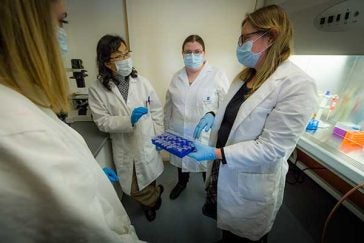
The National Institute for Environmental Health Sciences (NIEHS) hosted a virtual Federal Information Exchange workshop on July 31st 2020. The online session — attended by more than 260 researchers with federal funding, federal employees, and state health representatives — was the first in a series of virtual workshops, with the goal of sharing current knowledge on PFAS and defining research gaps. The focus of this workshop was placenta and liver impacts, and computational modeling to predict effects across species.

Dr. Angela Slitt, STEEP Project 3 Co-lead, was one of three NIEHS grantees to present their latest PFAS research at the workshop. Slitt’s work investigates the link between PFAS exposure and nonalcoholic fatty liver disease, a condition in which excess fat is stored in the liver. Her team compared genetic effects on human liver cells of different PFAS of varying concentrations and looked for gene expression changes and lipid accumulation. “We found that even environmentally relevant concentrations of PFAS exposure have the capacity to induce gene expression,” said Slitt. Her ongoing work examines the effects of novel PFAS, those that are replacing legacy PFAS, such as PFOA and PFOS. Slitt’s results suggest that only select novel PFAS caused fat accumulation in the liver, but these novel PFAS more strongly influenced gene expression changes in the test cells.

